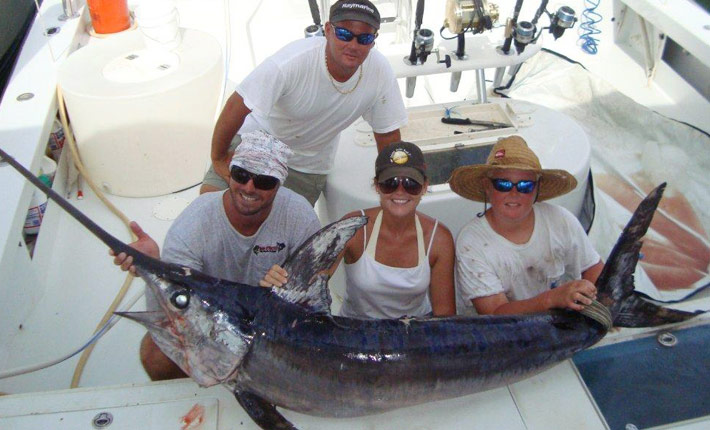<p style="text-align: justify;">So, chances are that when looking forward to that <strong>deep sea fishing </strong>trip you’ve always dreamed of, the two words you’d really prefer not to bring into the equation are ‘sea’ and ‘sickness’. It may sound like a rather gloomy way of approaching the subject, but if you’ve never been out on a trip like this into the open seas, you technically have no way of knowing whether or not you’ll find yourself a little on the queasy side…or worse.</p>
<p style="text-align: justify;">The trouble here is that the vast majority of newcomers to the sport simply assume they will be fine or just see the trip as a good way of finding out for sure. Sadly, if you find yourself 20 minutes into the day-long trip you’ve been dreaming of only to suddenly be overwhelmed by sickness…well, let’s just say it’s going to pan out more like a nightmare.</p>
<p style="text-align: justify;"><img class="aligncenter wp-image-12043 size-Correct-Size" src="https://medusamagazine.com/wp-content/uploads/2015/05/florida-keys-deep-sea-fishing-076-640x387.jpg" alt="How To Prevent Sea Sickness Putting A Stop To Your Fishing Trip " width="640" height="387" /></p>
<p style="text-align: justify;">However, the good news to be found in all the doom and gloom is that with the right approach and a few added extras in your bag, you’ll be able to effectively defend yourself against sea sickness even if it turns out that you do indeed have a rather sensitive stomach. So, with this in mind, here’s a quick overview of a few tried and tested tips for making sure a bout of sea sickness isn’t given the opportunity to ruin an otherwise stellar fishing trip:</p>
<h3 style="text-align: justify;"><strong>1 – Pack Some Meds</strong></h3>
<p style="text-align: justify;">First, foremost and undeniably most obvious of all is the common sense tip of packing some sea sickness meds with you to have on standby just in case. You might need them, you might not or you might be able to save the bacon of someone worse off than yourself – in any case, you won’t regret taking them along. Just be sure to buy them from a good chemist and ask for recommendation – all brands are most certainly not of the same calibre.</p>
<h3 style="text-align: justify;"><strong>2 – Try a Sickness Band</strong></h3>
<p style="text-align: justify;">You can buy all manner of bands, cuffs and wearable-type things these days that are supposed to bring huge relief to those wearing them by putting pressure on certain key areas. Now, it’s still very much debated as to how effective these things are – some swear by them and other swear the whole idea is ridiculous – but they cost next to nothing and are more than worth a shot. They can be especially useful for kids…power of suggestion and all that.</p>
<h3 style="text-align: justify;"><strong>3 – Avoid Caffeine</strong></h3>
<p style="text-align: justify;">It’s common to dive straight into one, two or a half-dozen coffees before heading out on a trip like this, but if it’s to be your first time trying out your sea legs, it might be advisable to abstain for a good 24 hours before setting sail. The reason being that caffeine’s very nature as a stimulant is such that it will increase the likelihood of you feeling a little green at one point or another during the trip. You can always have a coffee on-board if you take to the water well enough, but give it a miss beforehand.</p>
<h3 style="text-align: justify;"><strong>4 – Eat Sensibly</strong></h3>
<p style="text-align: justify;">In fact, it’s a good idea to keep a close eye on pretty much everything you eat and drink during the 24 hours before the trip as there are certain things that could be called very much a recipe for sea sickness. For example, you might want to go easy on the massive cheeseburgers and the overly spicy foods as these can do a number on you at the best of times.</p>
<h3 style="text-align: justify;"><strong>5 – Banish the Booze</strong></h3>
<p style="text-align: justify;">One of the most effective ways of making yourself as sick as a dog for the whole trip and ruining it for everyone is to turn up with a hangover – it’s a decision you’ll be regretting long after the trip comes to an end. What’s more, there’s a strong chance there will be alcoholic drinks on offer on the boat itself by way of free or paid refreshments – don’t even consider partaking if you’re even 1% concerned about sea sickness. When it comes to this kind of nausea, booze is bad news…period!</p>
<h3 style="text-align: justify;"><strong>6 – Fresh Air and Focus</strong></h3>
<p style="text-align: justify;">Last but not least, be sure to stay outdoors on the boat’s decks for as much of the trip as possible as going indoors will only make it worse. Be sure to get plenty of fresh air (far away from any diesel fumes) and try to keep your focus somewhere in the distance rather than the immediate scenery around you that might be moving up and down, back and forth at a much faster rate.</p>

How To Prevent Sea Sickness Putting A Stop To Your Fishing Trip
